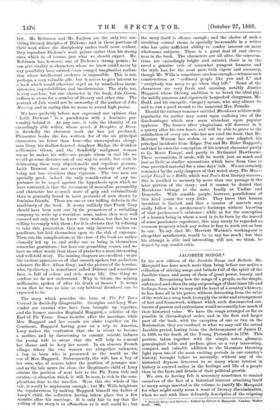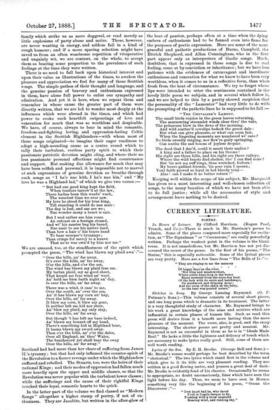JACOBITE SONGS.*
IN his new edition of the Jacobite Songs and Ballads, Mr. Macquoid has done much more than bring before our notice a collection of stirring songs and ballads full of the spirit of the Jacobite times, and many of them of great power, beauty, and pathos. Recognising how the songs of a people, as the simple, unfettered, and often the only outpourings of their inner life and feelings, form what we may call the heart of a country's history, he has done all in his power, without detracting from the value of the work as a song-book, to supply the order and arrangement of fact and framework, without which such disconnected out- bursts of passion and enthusiasm would neceasarilylose much of their historical value. We have the songs arranged as far as possible in chronological order, and in the first and larger part of the book, with the exception of one or tiVo on the Restoration, they are confined to what we may call the actual Jacobite period, lasting from the dethronement of james
in 1688, to the death of the Young Pretender in 1788. This portion, taken together with the simple notes, glossary, genealogical table, and preface, gives us a very interesting, compact, and valuable addition to the literature throwing light upon one of the most exciting periods in our country's history, brought before us naturally, without any of the historical dryness deterrent to so many whose interest in history is centred rather in the feelings and life of a people than in the facts and details of their political growth.
We own to having felt it necessary sometimes to remind ourselves of the fact of a historical interest attaching itself to many songs inserted in the volume, to justify Mr. Maequoid for what might easily seem a want of literary discrimination, when we met with lines delicately descriptive of the reigning
'" Jacobite Songs and Ballads. Edited by Gilbert S. Macquoid. London; Walter Scott. 1188.
family which strike us as mere doggerel, or read merely as little explosions of party abuse and satire. These, however, are never wanting in energy, and seldom fail in a kind of rough humour; and if a more sparing selection might have saved us from an often wearisome repetition of vituperative and ungainly wit, we are content, on the whole, to accept them as bearing some proportion to the prevalence of such feelings at the time they were written.
There is no need to fall back upon historical interest and upon their value as illustrations of the times, to awaken the pleasure and appreciation we feel for many of these Scottish songs. The simple pathos of their thought and language, and the genuine passion of bravery and enthusiasm expressed in them, have alone full power to enlist our sympathy and admiration. And yet it is here, when we repeat them and remember in whose cause the greater part of them were directly written, that we are led to wonder most deeply at the influences which were abroad in the times, and which had power to evoke such heartfelt outpourings of love and veneration for much that was so worthless and despicable. We have, of course, always to bear in mind the romantic, freedom-and-fighting loving, and oppression-hating Celtic element in the Scottish Highlanders—with whom most of these songs originated—to imagine their eager readiness to adopt a high-sounding cause as a centre round which to rally their turbulent, restless party spirit to which their passionate patriotic devotion might cling, and where their no less passionate personal affections might find countenance and support. But making due allowance for much that may have been selfish and personal, it is impossible not to marvel at such expressions of genuine devotion as breathe through such songs as "I ha'e nae kith, I ha'e nae kin," and "My love he was a Highland lad," of which we give two verses :—
"But had our good king kept the field,
When traitors tarrow'd at the law, There hadna been this waefu' wark, The weariest time we ever saw.
My love he stood for his true king, Till standing it could do use mair :
The day is lost, and sae are we ; Nae wonder mony a heart is sair.
But I wad rather see him roam An outcast on a foreign strand, And wi' his master beg his bread, Nae mair to see his native land,
Than bow a hair o' his brave head
To base usurper's tyrannye ; Than cringe for mercy to a knave That ne'er was own'd by him nor me."
We are amazed, too, at the steadfastness of the spirit which prompted the poem, "The wind has blawn my plaid awa' :"— " Over the hills, an' far away, It's over the hills, an' far away, O'er the hills, and o'er the sea, The wind has blawn my plaid frae me. My tartan plaid, my as good sheet, That keepit me frae wind an' weet, An' held me hien baith night an' day, Is over the hills, an' far away.
There was a wind, it cam' to me, Over the south, an' over the sea, An' it has blawn my corn an' hay, Over the hills, an' fax away. It blew my corn, it blew my gear, It neither left me kid nor steer, An' blew my plaid, my only stay, Over the hills, an' far away.
But though 't has left me bare indeed, An' blawn my bonnet off my head, There's something hid in Highland brae, It hasna blawn my sword away. Then o'er the hills, an' o'er the dales, Over all England, an' thro' Wales, The braidsword yet shall bear the sway Over the hills, an' far away."
Scotland had had more than her share of suffering from James II.'s tyranny ; but that had only inflamed the counter-spirit of the Revolution to a fiercer revenge under which the Highlanders suffered and rebelled. The Stuarts, too, were the heirs of their national Kings; and their modes of oppression had fallen much more heavily upon the upper and middle classes, so that the Revolution was never popular with the turbulent lower classes ; while the sufferings and the cause of their rightful Kings touched their loyal, romantic hearts to the quick.
In the latter part of the volume we find classed as "Modern Songs" altogether a higher stamp of poetry, if not of en- thusiasm. They are Jacobite, but written in the after-glow of
the heat of passion, perhaps often at a time when the dying embers of enthusiasm had to be fanned even into flame for the purposes of poetic expression. Here are some of the most graceful and pathetic productions of Burns, Campbell, the Ettrick Shepherd, and Allan Cunningham, who in the first part appear only as interpreters of Gaelic songs. Much, doubtless, that is expressed in these songs is due to real feeling, come at by conviction or inheritance ; but we have lees patience with the evidences of extravagant and inordinate enthusiasm and veneration for what we know to have been very worthless, when it comes to us in a reflective form, than when fresh from the heat of circumstance. We try to forget whose lips were intended to utter the sentiments contained in the lovely little poem we subjoin, and in several which follow it, and we are helped to this by a pretty shrewd suspicion that the personality of the " Lamenter " had very little to do with the prompting of the pathetic lines he is supposed to let fall :— " THE CHEVALIER'S LAMENT.
The small birds rejoice in the green leaves returning, The murmuring streamlet winds clear thro' the vale, The primroses blow in the dews of the morning, And wild scatter'd cowslips bedeck the green dale : But what can give pleasure, or what can seem fair, When the lingering moments are numbered wi' care ?
No birds sweetly singing, nor flow'rs gaily springing, Can soothe the sad bosom of joyless despair.
The deed that I dar'd, could it merit their malice ?
A king and a father to place on his throne ! His right are these hills, and his right are these valleys, Where the wild beasts find shelter, tho' I can find none !
But 'tis not my auff'rings, thus wretched, forlorn !
My brave gallant friends, 'tis your ruin I mourn ; Your faith proved so loyal in hot bloody trial- . Alas ! can I make it no better return !"
Keeping well within the scope of his subject, Mr. Macquoid has given us a most interesting and well-chosen collection of songs, to the many beauties of which we have not been able to do full justice ; while all the accessories of style and arrangement leave nothing to be desired.







































 Previous page
Previous page